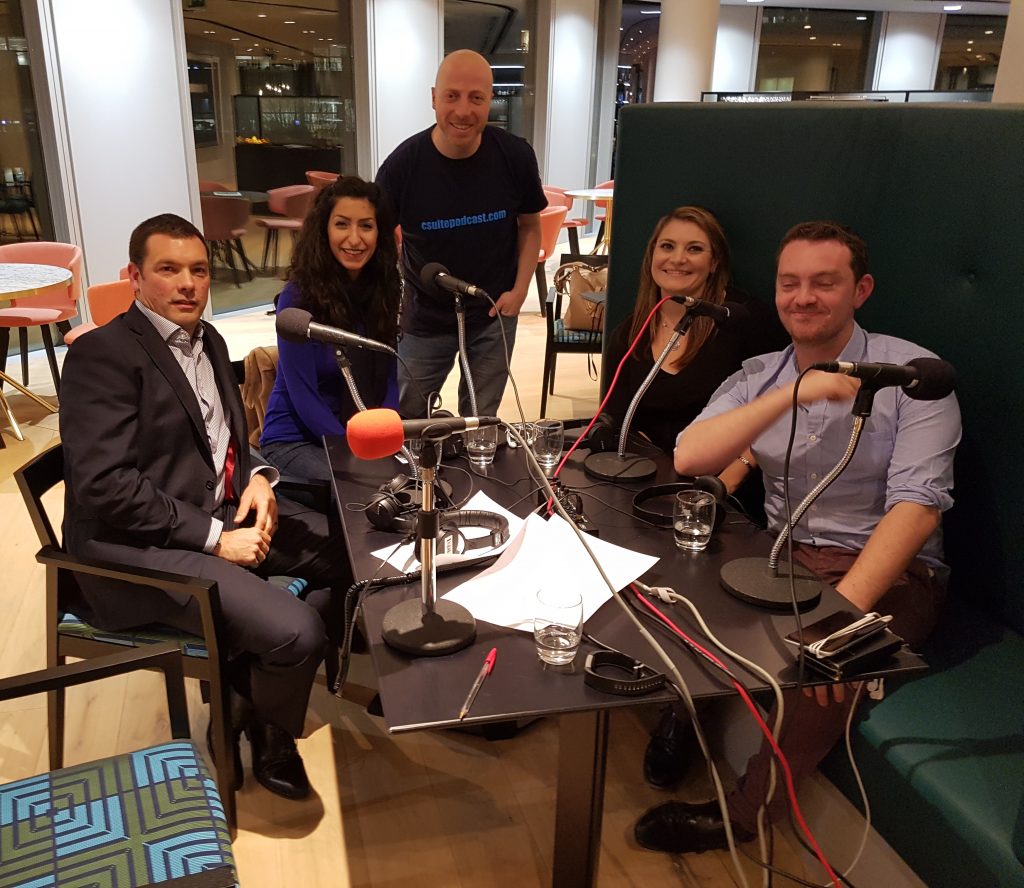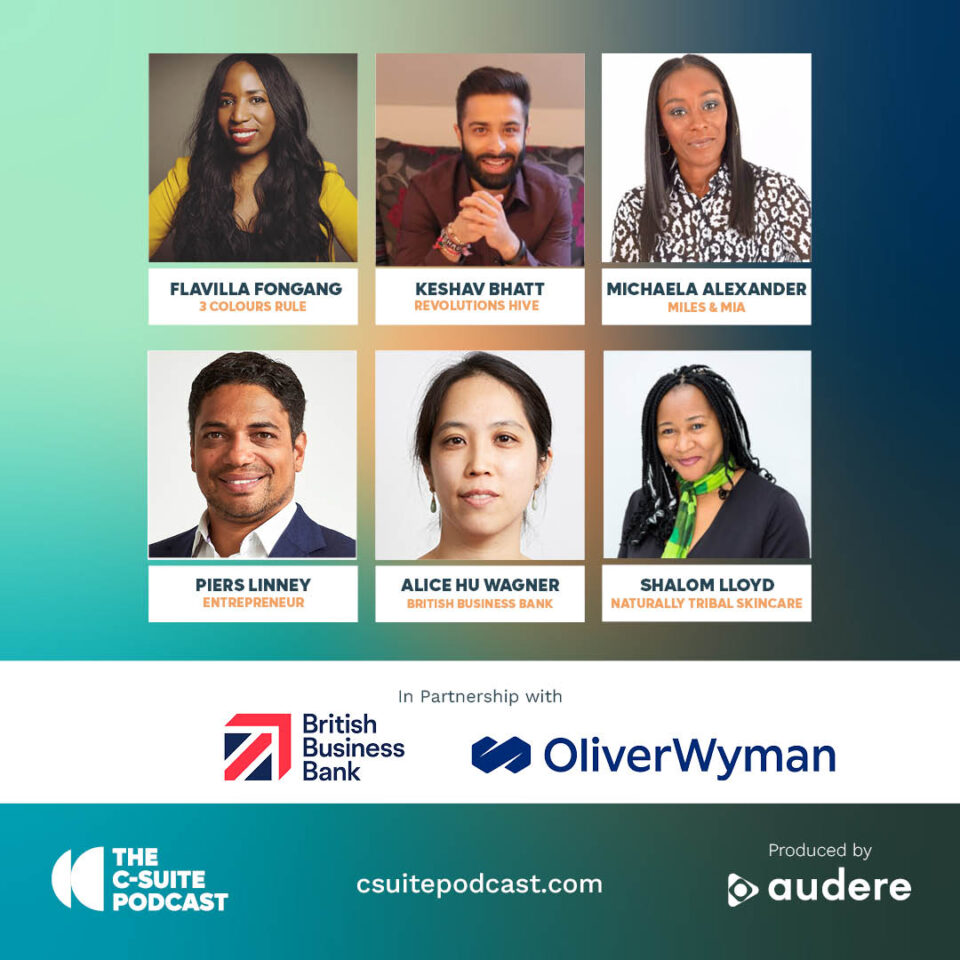
PRCA members receive 10 CPD posts for listening to this podcast if they log it on the PRCA CPD programme.
Recorded in partnership with Global Front Room, Show 60 discusses how to prepare for an investment pitch to successfully raise money in the UK.
Russell Goldsmith was joined by the Global Front Room’s CEO, Laura Mercurio and three successful entrepreneurs:
- Ben Corrigan, Co-Founder and Marketing Director of Pouch, who have developed an extension for your browser to automatically source the best available voucher codes for you. Ben also took his business onto Dragons’ Den and was only the third person in 15 series of the show to attract investment offers from all five Dragons.
- May Al-Karooni, CEO & Founder of Globechain, an online reuse platform that connects businesses, charities and people
- Graham Booth, CEO & Co-founder of 2iC, whose technology business’ clients include the Ministry of Defence.

L-R: Graham Booth, May Al-Karooni, Russell Goldsmith, Laura Mercurio, Ben Corrigan
Below is an overview of how each of the guests got their businesses to where they are now, their thoughts on the ease of gaining investment in the UK, their plans for the future, and a few tips they could share from their learnings along the way:
Ben Corrigan, Pouch
Starting Out
- Team of three co-Founders – Ben had experience in marketing and law, Johnny Plein was a Chartered Accountant and Vikram Simha, a CTO with 12 years’ experience of solutions architecture.
Financing
- Family & Friends round raised £18,000
- Built Minimal Viable Product (MVP)
- Got onto Mass Challenge Accelerator Programme and obtained $100,000 of free credit from Amazon, who were partners of the Programme, providing software and server capacity.
- Accelerator programme gave access to high net worth individual through a German software company and so had raised just under £100,000 for around 22% of the business, before even releasing to market.
- Won Mass Challenge, out of 1,300 companies that had applied.
- Received call from producers of BBC Dragons’ Den inviting them onto the show
- Week before going on show, spoke to their investor from software company, as Ben said it looks good on the show to have initial investors follow on [with further investment]
- Secured further £50,000 for around 6.5%
- Gained offers from all five ‘Dragons’ on the show, where offer was £75,000 for 18%
- Before show aired, they got a consortium of investors together, made estimations of how many people would download the product after seeing the show, and came up with a valuation of £3m pre-money.
- Raised £180,000 for just 5%.
Ease of gaining investment in the UK
- Ben believes that in the UK, investors want to take a huge amount of equity for a small amount of risk, but he thinks they are become less risk averse.
- He said there is no start up ecosystem in Europe like that of London, particularly with the Accelerator programmes and co-working spaces.
- The Autumn Budget doubled tax relief limits on Enterprise Investment Schemes (EIS)
Next steps for fundraising
- Onboarding more retailers
- Looking for Series A funding of around £2m-£5m (depending on how much equity they want to give away and how well they performed during Christmas 2017), aiming to go to market in Jan 2018 and close around June 2018.
- Look for ‘smart’ money – from people who can advance your business and provide mentorship
Things they would you have done differently
- Early on they spent too much percentage of their initial seed money on things that didn’t work, rushing to get their product out in time for Christmas, including expensive social media agencies and on a partnership that didn’t come to fruition, all in the hope of gaining customers before Christmas when they spend lots online.
- Making those kinds of mistakes has made them very cautious about how they spend now.
Last bits of advice
- Get a Co-Founder – someone with a different skillset but also for support
May Al-Karooni, Globechain
Starting Out
- May’s background is in investment Banking.
- When the company she worked for was moving offices, everyone was asked to pick new desks, chairs, computers and carpet colour.
- When she questioned what was happening to the existing items she found that there were no plans to do anything with them, not even give them to charity.
- Set up a prototype of Globechain, testing it for a year for free.
Financing
- Tried Accelerator Programmes and, given the product is about sustainability and social impact, grant funding from Government, .
- Nobody would touch it, because she found UK investors are quite risk averse and as she was creating a new business, where there was no existing market capitalisation, it was difficult for investors to compare it to anything.
- One investor firm did ask her to come back with two paying clients at £40,000 each and they will give her £150,000, but she thought, “Why would I do that?”!
- Broke even in third year and now that they are making money in their fourth year, with 10,000 members and clients such as Nando’s, NHS and Radisson Hotels, they are going for their first fundraise.
Ease of gaining investment in the UK
- Narrow your search down and look for the right kind of investor – in May’s case, she wanted philanthropic, B2B and/or marketplace type or investor.
Next steps for fundraising
- Now looking at international expansion
- Looking at ‘strategic money’ from who can help them in different countries and scale the market
- Mainly finding investors through referrals
Things they would you have done differently
- Partnered with a couple of start-ups who are no longer around, so would be more cautious in doing the same unless they are stable
- Possibly been too slow to market, but she’s done everything herself and so has learned every aspect of the business
Last bits of advice
- Don’t rush! A business that is growing steady, where you can control it is going to last longer than those who go out seeking PR to generate demand before having the infrastructure to be able to deal with the volumes.
- Thing from the beginning what you want to do with your company, i.e. exit, investors, co-founders etc
- Go to unusual networking events and not just start-up events
Graham Booth, 2iC
Starting Out
- Graham was running a New Zealand Software Company from the UK, which he built on behalf of someone else over a couple of years.
- One of his former IBM colleagues had been working in defence and convinced him to quit his job to start a new business, which they bootstrapped for a while, burning through their savings.
Financing
- Got a break when they won a small contract from the Ministry of Defence and at the same time gained an Innovate UK Grant.
- Both led to some investors putting in money into the business, meaning that they had a few hundred thousand pounds to increase the team and deliver the first phase of the product.
- have since had follow on funding from those same investors and some others have joined too.
- Now have contracts in Australia, New Zealand, US and UK.
Ease of gaining investment in the UK
- Sales cycles in UK are longer than New Zealand, for example. You might have to talk to a lot more people in a UK organisation before you find who the decision makers are – it’s rarely one person.
- More money in UK but route to it is longer, harder and more expensive.
Next steps for fundraising
- Aiming to scale up the business
- Talking to several investors, but also looking at partnership models, perhaps with partner companies that are already established in markets where they want to get to
Things they would you have done differently
- Spent too much money early on, trying to rush the MVP by underestimating what was required to get there.
- Took too long to engage with initial customers
- Also learned to always trust your gut feel – whenever he went against it, it was wrong!
Last bits of advice
- Surround yourself with as many people whose ideas you can piggy back off!
- Find the naysayers – those with opposite opinions. Don’t just surround yourselves with other start-ups who will be an echo-chamber
- Ask as many people for advice – you’ll get loads for free!
- If coming to the UK from another territory, i.e. Australia or New Zealand, find a Co-Founder, Partner or Joint Venture to give you in-market access and knowledge
For more information on Global Front Room, visit www.globalfrontroom.com/
All previous shows of the series are available on this website as well as Soundcloud, iTunes, TuneIn and Stitcher. There is also a growing community on Facebook and Twitter, where you can get involved in the discussion. Finally, if you subscribe to the show, please can you give it a positive rating and review on iTunes in particular as this helps it up the charts!


